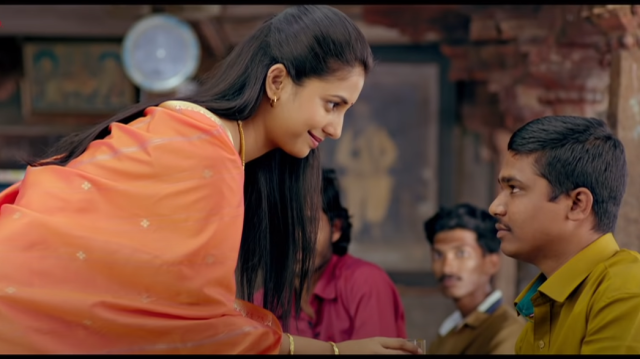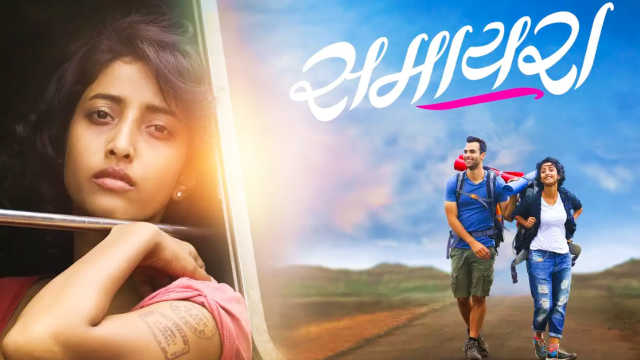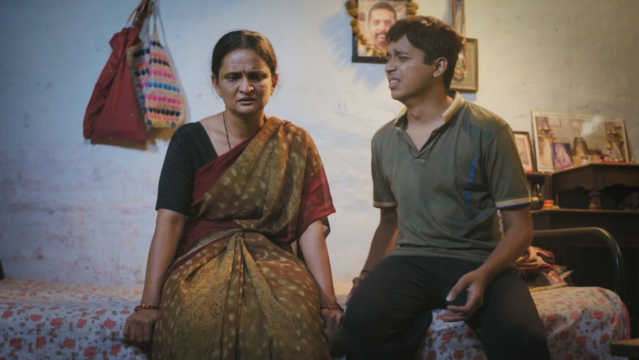
Suyog Zore
Mumbai, 30 Jan 2021 23:02 IST
The film addresses the important social issue of dowry in India but fails to do justice to the subject.

The dowry system has been one of the oldest social evils in India. The Dowry Prohibition Act was introduced in 1961 to prevent the giving or receiving of a dowry. But despite the efforts of the government and of social reformers, the system still prevails in India, particularly in the small towns.
Director Tanaji Ghadge tries to address this important social issue with his second directorial venture Basta, but the outcome is far from what he would have hoped for. The film revolves around Namdev (Suhas Palshikar), a poor farmer who wishes to get his daughter married to anyone but a farmer.
His daughter Swati (Sayali Sanjeev) shares his views and wants a government officer as her husband. Her wish comes true when her marriage is fixed with a 10th pass youth (Suraj Pawar) who works in a government office.
This is where the challenges begin for Namdev. The groom's family not only wants a hefty sum of money as dowry, but it also wants Namdev to bear all the expenses of the wedding, including the 'basta'. Basta is a tradition where the bride's and groom's families go shopping together.
Namdev tries his best to fulfil the never-ending demands of the groom's family, but how far can he stretch his limited resources? He has already pawned his farm land and the family's jewellery.
Then there is Manya (Akshay Tanksale), who is in unrequited love with Swati. He is your typical selfless lover who is ready to sacrifice his love for the 'greater good'. Manya also has a bona fide sidekick played by Parth Bhalerao, whose only job is to encourage his friend to propose to his lady love.

Arvind Jagtap's screenplay has many ebbs and flows, some of which are not necessary and have simply been shoe-horned into the script to make it more entertaining. Take, for example, Sagar Karande's character. He serves no clear purpose in the overarching theme of the film. He sometimes provides comic relief and at other times he is used to address another serious social problem, cow vigilantism, but that too is handled in an amateurish way and swiftly swept under the rug.
Another example of a superfluous character is Jyoti Subhash's grandmother. For some reason that is never explained, the film keeps showing supposedly funny flashbacks of said grandmother's wedding. The sequences are neither funny nor do they add anything to the story.
Jagtap's dialogues are serviceable without being memorable. In fact, this reviewer couldn't recall a single line of dialogue barely two hours after watching the film. The same goes for Ghadge's direction and the other technical departments, especially cinematography and production design. There is nothing memorable about the film from a technical standpoint. It's a formulaic social drama that lacks imagination in the technical departments and storytelling.
There are also some glaring continuity errors that should have been taken care of at least in post-production. Subodh Bhave, who puts in a guest appearance as a police inspector, sports a clean look with a thick moustache in one scene. When the camera pans right back in the same scene, the inspector is sporting a trimmed beard and moustache! The production team ought to have noticed such a glaring mistake.
The earnest performances from the cast are the saving grace in this otherwise lacklustre film. The scene stealer, obviously, is the film's lead, veteran Suhas Palshikar. He embodies the helplessness of a father who is stretching to the utmost to get his daughter married off, but faced with the ever growing demands of the groom's family, his resolve begins to crack. Shubhangi Gokhale stands out as his worried wife and mother of the bride-to-be.
Sayali Sanjeev and Tanksale are decent, and so are Pawar and Bhalerao. Prajakta Hamnagar, who plays an aunt of the groom, delivers another memorable character. She is irritating as hell, but that's what makes her character stand apart. The rest of the supporting cast has also done a fine job.
It is these earnest performances that make this predictable and preachy social drama bearable.
Basta is available on a pay-per-view basis on Zee Plex.
Related topics
Zee PlexYou might also like

Review Marathi
Samaira review: This well-intentioned travel drama suffers from a dull script
Actor Rishi Deshpande's directorial debut doesn't rise as much as its performances. ...

Review Marathi
Goshta Arjunchi review: Triggering conversations about mental health
Anupam Barve’s short film urges people to talk to their families about what they are going...

Review Marathi
Ekda Kaay Zala review: Sumeet Raghvan impresses in a film that does not use its full potential
Directed by Dr Saleel Kulkarni, the film has a fine act by child artiste Arjun Purnapatre....

